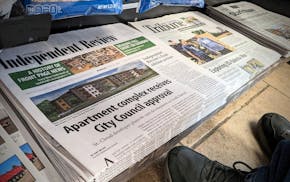Golf course, green space or houses.
Once again, that's the dilemma in Eagan, where land for building new homes is scarce and residents accustomed to bucolic views have joined with golfers to fight for preservation of the fairways.
Just a couple of years removed from a public battle that ended with Carriage Hills Golf Course turning into a new subdivision, residents are rallying to keep Parkview Golf Course -- the last 18-hole course in the city -- from the same fate.
The golf course's owners say declining business, a trend across the golf industry, has erased profits. And representatives of development company Hunter Emerson say demand from home builders for lots in Eagan, a well-located and attractive suburb, is up.
More than 100 people packed the City Council chambers last week for a meeting of Eagan's Advisory Planning Commission. Those opposed to the plan turned over a petition, signed by more than 400 people, asking for more time to study the proposal before the city makes a decision on changing the use of the property.
"Everybody we talk to is shocked or surprised, A, that it's happening or, B, that it's such short notice," said Pat Campbell, a leader of the neighborhood response. "Let's slow down and have a dialogue about this."
The planning commission, on a 5-1 vote, recommended that the City Council deny the request to change the land use from its current parks designation to allow for low-density housing development.
The City Council will consider the issue June 19. If it opts for the land-use change, the amendment to the comprehensive plan would be forwarded to the Metropolitan Council, which also must approve it.
For the project to move forward, the developers would also need to submit a more detailed plan for consideration after the land-use change.
175 houses
Eagan resident Kurt Manley of Hunter Emerson LLC said the company's plans call for 175 houses, priced from the upper $200,000s to the middle $600,000s on the 80 acres the golf course occupies.
"We tried to take as much from the neighbors' input as we could," he said.
The developers have hosted two neighborhood meetings and shuffled the plan to reposition a community center when residents worried about noise. The development would include a natural buffer around the edges as a gesture to the neighbors accustomed to the open space behind their homes, and public amenities, including a trail connection to Lebanon Hills Regional Park.
But any development worries neighbors who question the effect it would have on property values, traffic, recreation opportunities and the environment.
Bill Cutter said Parkview was one of the main reasons his family bought its house, with a back yard along the 16th hole, more than 20 years ago.
"I just never wanted a home where I could back up to other homes," he said.
Raising concerns about the environment, many residents wondered if Parkview, adjacent on two sides to Lebanon Hills Regional Park, should at minimum be converted into protected open space.
But, mostly, there were passionate pleas about preserving the golf course, known for nurturing young golfers in junior leagues and having topography accessible to senior citizens.
"There's always someone on the first tee," said Mark Wanous, boys' golf coach at Eastview High School. "I just don't know with the closing of Carriage Hills and now potentially Parkview, where are these golfers going to go?"
Robert Zakheim, one of the owners of the course, said it was nice to hear of people's attachment to the course, but acknowledged it has been losing money for many years.
He said the number of rounds played annually has dropped from 50,000 to 37,000 at a time when it's tough to raise prices at the entry-level executive course because many of the more expensive clubs have cut rates to attract more golfers.
"That's not a business that's sustainable," he said. "The only other viable use for the property at this time is a housing development."
Déjà vu
Planning commission member Daniel Piper pointed out the battle over Carriage Hills was the "elephant in the room."
Residents fought for years to keep that 18-hole golf course from being turned into a development with 480 houses, advocating that it remain as a park or green space.
That battle included a suit against the city, a settlement that allowed for development and preserved open space, and a failed referendum to raise taxes for the city to buy the course.
When the dust settled, Lennar Corp. stepped in as the new developer and started construction in 2010, renaming the property Stonehaven.
In recommending denial of the land use change at Parkview, planning commission members said they wondered if the low-density residential development was in the best interest of the city when studies have shown other housing needs, especially for the growing population of senior citizens.
Manley said he would try to modify the proposal to address that concern before the June City Council meeting.
Katie Humphrey 952-746-3286

BCA says man pointed pistol-style BB gun at officers before he was shot in Woodbury

In Grand Rapids, Itasca Pride is planning its first event, but there is already pushback

Former diversity worker sues University of Minnesota after firing over swastika photo

